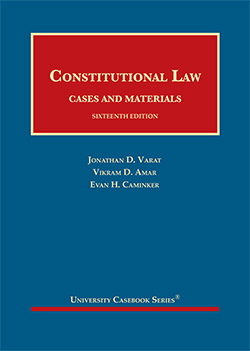- Home
- Constitutional Law, Cases and Materials
Constitutional Law, Cases and Materials
This title is a part of our CasebookPlus™ offering as ISBN 9781636590448. Learn more at
Faculty-CasebookPlus.com.
This casebook continues to focus primarily upon Supreme Court opinions and other primary documents, offering deep and wide coverage of almost all major areas of constitutional doctrine in a way very few other casebooks do. For decades, the distinctive pedagogical approach reflected in the book – its commitment to providing as much of the raw decisional, statutory and historical background material as is practical – has allowed teachers to structure constitutional law courses as they see fit, and has encouraged students to formulate their own generalizations directly from the materials. The book provides comprehensive coverage of all major traditional constitutional topics, including the role of the federal judiciary, separation of powers, federalism, the non-criminal provisions of the Bill of Rights, the Reconstruction Amendments (including all aspects of due process, equal protection, and congressional powers to enforce them), and the First Amendment’s protections of freedom of speech, freedom of the press, and freedom of religion.
Current through the presidential inauguration of Joseph Biden and the second impeachment trial of Donald Trump, the 16th edition contains notable updates, including expanded discussion of constitutional review outside of courts; reorganized and expanded discussions of the topics of Article III jurisdiction, executive authority and presidential immunity; reworked or updated treatments of takings, racial and partisan gerrymandering, offensive and commercial speech, compelled speech and freedom of association; and significant recent developments interpreting the First Amendment’s prohibitions of religious establishment and interference with the free exercise of religion.
Imprint: Foundation Press
Series: University Casebook Series
Publication Date: 06/09/2021
Jonathan D. Varat, University of California-L.A. School of Law
Vikram D. Amar, University of Illinois College of Law
Evan H. Caminker, University of Michigan Law School
CasebookPlus™
This title is available in our CasebookPlus format. CasebookPlus provides support beyond your classroom lectures and materials by offering additional digital resources to you and your students. Anchored by faculty-authored formative self-assessments keyed to our most popular casebooks, CasebookPlus allows students to test their understanding of core concepts as they are learning them in class – on their own, outside of the classroom, with no extra work on your part. CasebookPlus combines three important elements:
- A new print or digital casebook
- Access to a downloadable eBook with the ability to highlight and add notes
- 12-month access to a digital Learning Library complete with:
- Chapter questions keyed to the casebook
- Black Letter Law questions (available in select subjects)
- Subject area review questions for end of semester use
Leading digital study aids, an outline starter, and audio lectures in select subjects
Students can still utilize CasebookPlus digital resources if they’ve purchased a used book or are renting their text by purchasing the Learning Library at westacademic.com.
With CasebookPlus, you can customize your students’ learning experience and monitor their performance. The quiz editor allows you to create your own custom quiz set, suppress specific quiz questions or quiz sets, and time-release quiz questions. Additionally, the flexible, customized reporting capability helps you evaluate your students’ understanding of the material and can also help your school demonstrate compliance with the new ABA Assessment and Learning Outcomes standards.
Varat, Amar, and Caminker's Constitutional Law, Cases and Materials, 16th, 2023 Supplement
Varat, Amar, and Caminker's Constitutional Law, Cases and Materials, 16th, 2024 Supplement
Current through the presidential inauguration of Joseph Biden and the second impeachment trial of Donald Trump, the 16th edition contains notable updates, including expanded discussion of constitutional review outside of courts; reorganized and expanded discussions of the topics of Article III jurisdiction, executive authority and presidential immunity; reworked or updated treatments of takings, racial and partisan gerrymandering, offensive and commercial speech, compelled speech and freedom of association; and significant recent developments interpreting the First Amendment’s prohibitions of religious establishment and interference with the free exercise of religion.
Learn more about this series.
Access Denied
Law School Faculty - Sign in or Create an Account to access this content. Law faculty who have created an account can sign in after receiving email notification that registration has been approved. Email accountmanager@westacademic.com or call 800-313-9378 for assistance.
Other Higher Education Faculty who wish to access digital review copies or teaching resources should contact their West Academic Account Manager at college@westacademic.com or 800-360-9378.
Adopters Only
This content is intended for adopters only. Sign in or Create an Account to access this content. Law faculty who have created an account can sign in after receiving email notification that registration has been approved. If you are an adopter who is unable to access this content after signing in, contact your account manager for assistance at accountmanager@westacademic.com or call 800-313-9378 for assistance.
Access Denied
Sign in or Create an Account to access this content. Faculty who have created an account can sign in after receiving email notification that registration has been approved. Contact us for assistance.
Law School Faculty: email accountmanager@westacademic.com or call 800-313-9378.
Other Higher Education Faculty: email college@westacademic.com or 800-360-9378.
Access Denied
Higher education faculty who wish to view this document should contact their West Academic Account Manager at college@westacademic.com or 800-360-9378.

